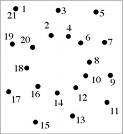
After writing a few posts about ideation in the HR/Recruiting industries, I got to thinking about some issues that professionals in these jobs face on a daily basis.
One of them is the fact that HR/Recruiting is still not seen as a strategic partner among corporate executive leadership. There have been countless things written about this topic, so hopefully I won't be beating a dead horse...at least, not too much. ;)
But it occurs to me that one of the problems is that these two departments (HR and Recruiting) have historically done a horrible job at "connecting the dots." In other words, seeing patterns and themes as they emerge and making sense out of them.
At the most basic level, that's one of the things every leader must do. Make sense of all the "stuff" flying around and then connect the dots for their people. On top of this, great leaders string these threads together faster than anyone else does. They communicate these threads in a manner that makes sense to the people that follow them, and in a manner that motivates them to do something.
Question: how fast can you thread together what you just read on Google News, the conversation you had last night with a colleague in the paper mill industry, a recruiting idea that you just talked about with your team, the latest quarterly earnings statement of your organization...and figure out what you as a leader need to do in order to position yourself, your team, and your organization for what needs to be done in order to survive in the New Economy?
The sad thing is, the recruiting and HR functions I've personally witnessed have always RE-acted to everything. Is this a symptom of something else? Perhaps it means that these functions aren't doing such a great job connecting all the dots. Perhaps these functions are being led by leaders who haven't been able to string the external threads together fast enough to keep up with the rest of the business landscape.
An example? What about the Director of Recruiting within a large Fortune 500 firm that, when asked, can't really articulate what is going on in other functions within the organization? Worse yet, what about when the Director of Recruiting really can't articulate how the actions of other BUs affects his/her department?
Is that an indication that the pulse of the organization is not being kept by such leaders? Or is it an indication of something deeper?
...that perhaps, as numerous people have already said...people in HR and Recruiting just don't "get" business?
No comments:
Post a Comment